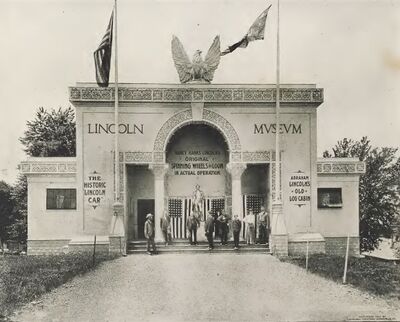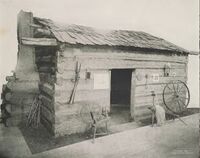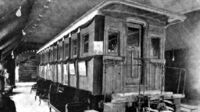Lincoln Exhibit: Difference between revisions
No edit summary |
No edit summary |
||
| (9 intermediate revisions by the same user not shown) | |||
| Line 1: | Line 1: | ||
{{short description|Lincoln Exhibit}} | {{short description|Lincoln Exhibit}} | ||
{{Infobox | {{Infobox FairBuilding | ||
| name = Lincoln Exhibit | | name = Lincoln Exhibit | ||
| image = Lincoln Exhibit.jpg | | image = Lincoln Exhibit.jpg | ||
| image_size = | | image_alt = | ||
| caption = Lincoln | | image_size = 400px | ||
| alternate_name = | | caption = Main entrance of Lincoln Museum | ||
| | | alternate_name = Lincoln Museum | ||
| location = [[The Trail]] | |||
| | | no_buildings = 1 | ||
| | | construction_cost= $6,500 (${{Format price|{{Inflation|US|6,500|1904}}}} in {{Inflation/year|US}}) | ||
| furnishing_cost = | |||
| profit = $6,653 | | profit = $6,653 (${{Format price|{{Inflation|US|6,653.65|1904}}}} in {{Inflation/year|US}}) | ||
| owner = | | owner = Franklyn B. Snow | ||
| | | architect = | ||
| | | dimensions = | ||
| | | adult_entry = 15¢ (${{Inflation|US|.15|1904}} in {{Inflation/year|US}}) | ||
| child_entry = | |||
| opening_day = | |||
| dedication_day = | |||
| special_day = | |||
| other = | | other = | ||
}} | }} | ||
Near the [[Illinois]] pavilion on [[The Trail]] was the attraction that showcased the life and death of President Abraham Lincoln. | Near the [[Illinois]] pavilion on [[The Trail]] was the attraction that showcased the life and death of President Abraham Lincoln. | ||
== | ==Description== | ||
Inside the museum, a long chamber contained the President's boyhood log cabin, and at the other end his funeral car. | |||
== | ===Cabin=== | ||
[[File:Lincolns Cabin.jpg|200px|left|Lincoln's Log Cabin]] | |||
When he was four years old Abraham Lincoln lived in a log cabin in what was then Hardin county, Kentucky (now Larue county). That cabin, duly authenticated, was brought to the World’s Fair and reassembled log by log. The hewn logs look their age. The space between the logs is chinked with yellow clay. They enclose a single room about fifteen feet square. The cabin was bought by Lincoln’s father for 20 dollars and ten barrels of whiskey. | |||
Within the cabin, various displays of Lincoln's youth were shown. Upon the crude mantel above the fireplace is an old fashioned clock which belonged to the Lincoln family. Within the cabin was the wheel upon which Nancy Hanks spun and the loom upon which she wove. | |||
===Funeral Car=== | |||
[[File:Lincolns Car.jpg|200px|right|Lincoln's Funeral Car]] | |||
The funeral car, was also the president’s and his cabinet’s official coach during the Civil War. In this rail car, the president was carried from city to city, a long roundabout way of nearly two thousand miles, to his final resting place among the oaks on the edge of Springfield. | |||
The car was famous rolling stock in its day. When turned out of the military car shops, which the United States conducted at Alexandria during the Civil War, this coach was considered the finest in the country. It was the official car of the President, the only official car made for a President of the United States. | |||
In design, the car was forty-two feet long inside and had a raised roof with circular ends. It had three partitioned rooms, consisting of stateroom, drawing-room and reception-room, in the stateroom was Mr. Lincoln's private room and in this is the 7 foot long sofa, which can be made into a bed for the 6' 4" President | |||
The upper deck between transoms, contains panels, on which are painted the coats-of-arms of the several different States then forming the Union, and on the outside, occupying a space of 5 feet long and 3 feet wide, are two oval-shaped panels of steel, on which are painted the coat-of-arms of the United States. | |||
The inside, in its entirety, was upholstered with rich crimson-colored silk. All of the original furniture, with the exception of two or three pieces, was on exhibition with the car. | |||
The | The car was brought in from the Union Pacific railroad boneyard in Omaha, Nebraska, where it had been slowly decaying. During the time stored in the boneyard, the decorated exterior, had become cracked and weather-beaten. Inside the several compartments furnishings had been removed and the silk was removed by the hands of vandals. <ref>The Famous Lincoln Car, ''The St Louis Republic'', 01 May 1904,pg 38 </ref> | ||
After the fair, the car was purchased by the Twin City Rapid Transit Company President Thomas Lowry. | |||
In 1911, a grass fire erupted March 18 and engulfed the car, reducing it to ash. | |||
==See also== | ==See also== | ||
| Line 37: | Line 57: | ||
==References== | ==References== | ||
<references/> | |||
==External links== | ==External links== | ||
[[Category: | [[Category:The Trail]] | ||
Latest revision as of 21:40, 30 November 2022
 | |
| Alternative names | Lincoln Museum |
|---|---|
| Location | The Trail |
| No. of Buildings | 1 |
| Owner | Franklyn B. Snow |
| Construction | |
| Construction Cost | $6,500 ($196,035 in 2021) |
| Proft | $6,653 ($200,669 in 2021) |
| Entry | |
| Adult Entry | 15¢ ($5 in 2021) |
Near the Illinois pavilion on The Trail was the attraction that showcased the life and death of President Abraham Lincoln.
Description[edit | edit source]
Inside the museum, a long chamber contained the President's boyhood log cabin, and at the other end his funeral car.
Cabin[edit | edit source]

When he was four years old Abraham Lincoln lived in a log cabin in what was then Hardin county, Kentucky (now Larue county). That cabin, duly authenticated, was brought to the World’s Fair and reassembled log by log. The hewn logs look their age. The space between the logs is chinked with yellow clay. They enclose a single room about fifteen feet square. The cabin was bought by Lincoln’s father for 20 dollars and ten barrels of whiskey.
Within the cabin, various displays of Lincoln's youth were shown. Upon the crude mantel above the fireplace is an old fashioned clock which belonged to the Lincoln family. Within the cabin was the wheel upon which Nancy Hanks spun and the loom upon which she wove.
Funeral Car[edit | edit source]

The funeral car, was also the president’s and his cabinet’s official coach during the Civil War. In this rail car, the president was carried from city to city, a long roundabout way of nearly two thousand miles, to his final resting place among the oaks on the edge of Springfield.
The car was famous rolling stock in its day. When turned out of the military car shops, which the United States conducted at Alexandria during the Civil War, this coach was considered the finest in the country. It was the official car of the President, the only official car made for a President of the United States.
In design, the car was forty-two feet long inside and had a raised roof with circular ends. It had three partitioned rooms, consisting of stateroom, drawing-room and reception-room, in the stateroom was Mr. Lincoln's private room and in this is the 7 foot long sofa, which can be made into a bed for the 6' 4" President
The upper deck between transoms, contains panels, on which are painted the coats-of-arms of the several different States then forming the Union, and on the outside, occupying a space of 5 feet long and 3 feet wide, are two oval-shaped panels of steel, on which are painted the coat-of-arms of the United States.
The inside, in its entirety, was upholstered with rich crimson-colored silk. All of the original furniture, with the exception of two or three pieces, was on exhibition with the car.
The car was brought in from the Union Pacific railroad boneyard in Omaha, Nebraska, where it had been slowly decaying. During the time stored in the boneyard, the decorated exterior, had become cracked and weather-beaten. Inside the several compartments furnishings had been removed and the silk was removed by the hands of vandals. [1]
After the fair, the car was purchased by the Twin City Rapid Transit Company President Thomas Lowry.
In 1911, a grass fire erupted March 18 and engulfed the car, reducing it to ash.
See also[edit | edit source]
Notes[edit | edit source]
References[edit | edit source]
- ↑ The Famous Lincoln Car, The St Louis Republic, 01 May 1904,pg 38
